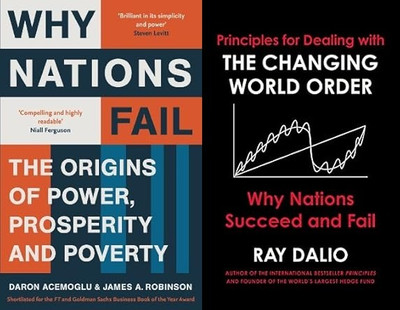WHY NATIONS FAIL + Principles For Dealing With The Changing World Order: Why Nations Succeed And Fail(Paperback, Daron Acemoglu, Ray Dalio)
Quick Overview
Product Price Comparison
Shortlisted for the Financial Times and Goldman Sachs Business Book of the Year Award 2012.Why are some nations more prosperous than others? Why Nations Fail sets out to answer this question, with a compelling and elegantly argued new theory: that it is not down to climate, geography or culture, but because of institutions. Drawing on an extraordinary range of contemporary and historical examples, from ancient Rome through the Tudors to modern-day China, leading academics Daron Acemoglu and James A. Robinson show that to invest and prosper, people need to know that if they work hard, they can make money and actually keep it - and this means sound institutions that allow virtuous circles of innovation, expansion and peace.Based on fifteen years of research, and answering the competing arguments of authors ranging from Max Weber to Jeffrey Sachs and Jared Diamond, Acemoglu and Robinson step boldly into the territory of Francis Fukuyama and Ian Morris. They blend economics, politics, history and current affairs to provide a new, powerful and persuasive way of understanding wealth and poverty.NEW YORK TIMES BESTSELLER * MORE THAN ONE MILLION COPIES SOLDŌĆ£A provocative read...There are few tomes that coherently map such broad economic histories as well as Mr. DalioŌĆÖs. Perhaps more unusually, Mr. Dalio has managed to identify metrics from that history that can be applied to understand today.ŌĆØ ŌĆöAndrew Ross Sorkin, The New York TimesFrom legendary investor Ray Dalio, author of the #1 New York Times bestseller Principles, who has spent half a century studying global economies and markets, Principles for Dealing with the Changing World Order examines historyŌĆÖs most turbulent economic and political periods to reveal why the times ahead will likely be radically different from those weŌĆÖve experienced in our lifetimesŌĆöand to offer practical advice on how to navigate them well.A few years ago, Ray Dalio noticed a confluence of political and economic conditions he hadnŌĆÖt encountered before. They included huge debts and zero or near-zero interest rates that led to massive printing of money in the worldŌĆÖs three major reserve currencies; big political and social conflicts within countries, especially the US, due to the largest wealth, political, and values disparities in more than 100 years; and the rising of a world power (China) to challenge the existing world power (US) and the existing world order. The last time that this confluence occurred was between 1930 and 1945. This realization sent Dalio on a search for the repeating patterns and cause/effect relationships underlying all major changes in wealth and power over the last 500 years.In this remarkable and timely addition to his Principles series, Dalio brings readers along for his study of the major empiresŌĆöincluding the Dutch, the British, and the AmericanŌĆöputting into perspective the ŌĆ£Big CycleŌĆØ that has driven the successes and failures of all the worldŌĆÖs major countries throughout history. He reveals the timeless and universal forces behind these shifts and uses them to look into the future, offering practical principles for positioning oneself for whatŌĆÖs ahead.


